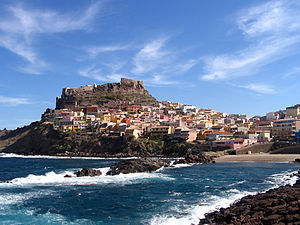Spanish expedition to Sardinia
| Spanish expedition to Sardinia | |||||||
|---|---|---|---|---|---|---|---|
| Part of War of the Quadruple Alliance | |||||||
 View of the town of Castellaragonese (Spanish: Castillo Aragonés) |
|||||||
|
|||||||
| Belligerents | |||||||
|
|
|
||||||
| Commanders and leaders | |||||||
|
|
|
||||||
| Strength | |||||||
| 9,000 men 9 ships of the line 6 frigates 3 galleys 2 fireships 80 transport ships |
Unknown | ||||||
Decisive Spanish victory
The Spanish conquest of Sardinia, also known as the Spanish expedition to Sardinia, took place between the months of August and November 1717. It was the first military action between the Kingdom of Spain and the Holy Roman Empire after the War of the Spanish Succession (1701–1714), and was the direct cause of the War of the Quadruple Alliance (1718–1720). The Spanish troops commanded by the Marquis of Lede and Don José Carrillo de Albornoz, 1st Duke of Montemar, supported by the Spanish fleet, defeated the Emperor's troops easily, and conquered the entire island of Sardinia, which had been ruled by the Emperor since the Treaty of Rastatt (1714), returning it again and for the final time to Spain.
After the War of the Spanish Succession, with the Treaty of Rastatt, Spain lost all its possessions in Sardinia, Italy and the Low Countries. The Kingdom of Sardinia, the Spanish Netherlands, the Duchy of Milan and the Kingdom of Naples were given to Austria, while Sicily was given to the Duke of Savoy. These territories had been under Spanish rule for nearly two centuries, and their loss was perceived as a great blow to the country in both practical and prestige terms.
In 1717, with the rise of Spain as an important military power again, and the ambitions of King Philip V of Spain to regain Spanish supremacy in Italy and the Mediterranean, the rest of the European powers, Great Britain, France and Austria, to strengthen the Treaty of Utrecht (1713), contemplated ceding Sicily to the Holy Roman Emperor Charles VI, but this arrangement displeased Spain, which wanted to recover the island. With this background, and the arrest in Milan of Spanish Grand Inquisitor Jose Molina by the Austrians, Philip V obtained the pretext he sought. In July, the King of Spain ordered the Spanish fleet, prepared in Barcelona, to conquer Sardinia, initiating hostilities with Austria.
...
Wikipedia
